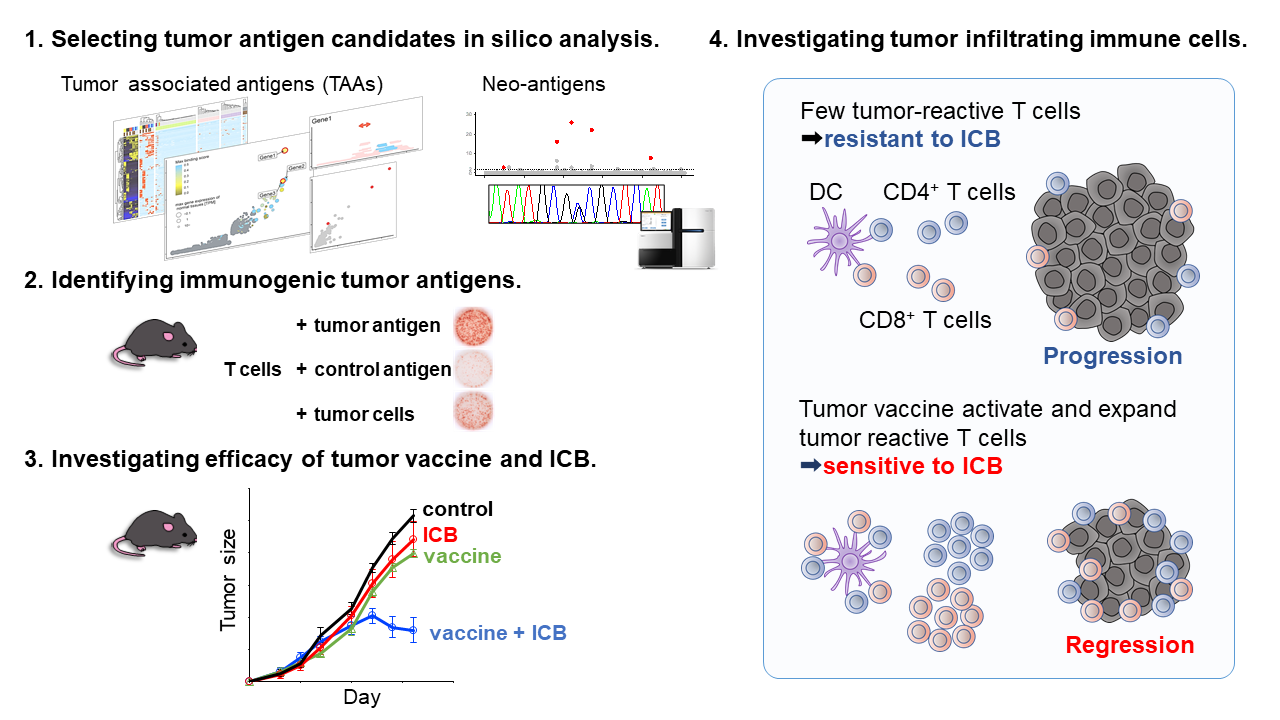Back
Poster, Podium & Video Sessions
Podium
PD12: Bladder Cancer: Basic Research & Pathophysiology II
PD12-12: Tumor antigen vaccine enhances anti-tumor effects of Immune checkpoint inhibitors against refractory cancers.
Friday, May 13, 2022
2:50 PM – 3:00 PM
Location: Room 244
Shohei Ueda*, Miho Ushjima, Fukuoka-shi, Japan, Atsushi Irie, Yasuharu Nishimura, Kumamoto-shi, Japan, Masatoshi Eto, Fukuoka-shi, Japan
- SU
Podium Presenter(s)
Introduction: Progressive and chemoresistant bladder cancer is problematic because of the poor prognosis. immune checkpoint blockade(ICB) have exhibited drastic anti-tumor efficacy in some patients, but the response rates is limited. Therefore, to improve efficacy of immunotherapy for refractory cancer, we have tried to develop a combination immunotherapy of tumor antigen vaccine and ICB in tumor-bearing mouse models.
Methods: We identified genes highly expressed in tumors but not in normal tissues by comparing RNA-seq data of mouse bladder cancer MB49, cisplatin-resistant MB49-CR, and lymphoma RMA cell lines, all of which are refractory to ICB, with datasets of 26 normal mouse tissues. Subsequently tumor-associated antigens-derived peptides predicted to have high binding affinities to MHC-I and -II molecules were identified by prediction algorithms. We also selected immunogenic and cancer-specific mutated Neo-antigenic peptides. MB49, MB49-CR, or RMA bearing mice were treated with these peptides vaccine and ICB. Finally, we investigated tumor infiltrating immune cells by flow cytometry, TCR repertoire analysis, and RNA-seq of inoculated tumors.
Results: In 50-80% of mice pre-immunized with these peptides, a growth of MB49 and RMA inoculated s.c. was prevented and those immunized mice rejected re-transplanted tumors. Furthermore, combination therapy of these peptide vaccines, and ICB synergistically inhibited tumor-growth of MB49-CR, MB49 and RMA indicating that the combination immunotherapy described above enhances therapeutic efficacy to treat refractory cancers. We also observed increases of tumor infiltrating CD8+ T cells expressing limited TCR-alpha and beta genes, and drastic changes of various types of tumor-infiltrating immune cells in tumor-bearing mice treated with the combination therapy.
Conclusions: These results suggest that the combination immunotherapy described above enhances therapeutic efficacy to treat refractory cancer.
Source of Funding: This work was supported by KAKENHI.

Methods: We identified genes highly expressed in tumors but not in normal tissues by comparing RNA-seq data of mouse bladder cancer MB49, cisplatin-resistant MB49-CR, and lymphoma RMA cell lines, all of which are refractory to ICB, with datasets of 26 normal mouse tissues. Subsequently tumor-associated antigens-derived peptides predicted to have high binding affinities to MHC-I and -II molecules were identified by prediction algorithms. We also selected immunogenic and cancer-specific mutated Neo-antigenic peptides. MB49, MB49-CR, or RMA bearing mice were treated with these peptides vaccine and ICB. Finally, we investigated tumor infiltrating immune cells by flow cytometry, TCR repertoire analysis, and RNA-seq of inoculated tumors.
Results: In 50-80% of mice pre-immunized with these peptides, a growth of MB49 and RMA inoculated s.c. was prevented and those immunized mice rejected re-transplanted tumors. Furthermore, combination therapy of these peptide vaccines, and ICB synergistically inhibited tumor-growth of MB49-CR, MB49 and RMA indicating that the combination immunotherapy described above enhances therapeutic efficacy to treat refractory cancers. We also observed increases of tumor infiltrating CD8+ T cells expressing limited TCR-alpha and beta genes, and drastic changes of various types of tumor-infiltrating immune cells in tumor-bearing mice treated with the combination therapy.
Conclusions: These results suggest that the combination immunotherapy described above enhances therapeutic efficacy to treat refractory cancer.
Source of Funding: This work was supported by KAKENHI.


.jpg)
.jpg)